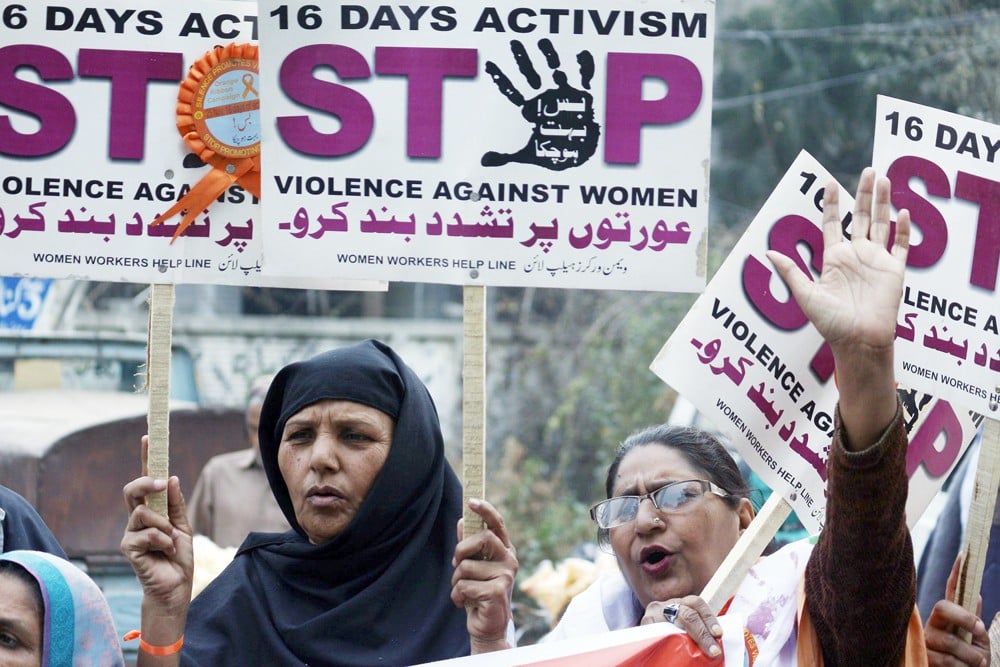
While legislation in favour of women is the result of continuous hard work of women’s rights organisations, a lot remains to be done

In just a matter of days, in addition to a display of misogynistic attitudes both in the parliament and on national television, there have been incidents of horrific violence against women in Murree, Lahore, and Kasur. Completely out of touch with the changing environment -- the dynamics of urbanisation and globalisation that have increased women’s mobility and participation in the public sphere -- are the conservative rightwing.
"When it comes to violence against women, the state has had a history of being complicit. Why have we gotten to this point? It is because the state has provided men impunity and all of a sudden, that is being challenged," says Nabiha Meher Shaikh, a member of Women’s Action Forum.
"Having said that, it would be unrealistic to expect NGOs to do all the work," she adds.
"I think Shirkat Gah has been the most successful. They have been around for so long and they were probably the first proper ‘feminist’ organisation and a sort of mother organisation. Women’s Action Forum was born later and was very successful too in Sindh and Hyderabad," she points out.
"At the moment, the organisation is still actively engaged in bringing about change. Then there is Aurat Foundation which is now more or less engaging the media through numbers and statistics (this leaves a lot more to be desired). Simorgh, [another women’s rights NGO] has been working on textbooks and education and gender sensitivity," she adds.
"It is only in the past 10 years or so that the focus has been on changing mindsets which is a great change in itself. The impact of this has been quite massive," she says.
"It was during the PML-N’s government in the 1990s when a huge number of honour killings took place and it is during the same party’s tenure that we are now condemning honour killings after Sharmeen Obaid Chinoy’s documentary film. I think the movement has been very successful in changing people’s minds and motivating women to stand up for themselves even in the face of violence," she comments.
Sonia Qadir, Legal Advisor for Punjab Commission on the Status of Women (PCSW), agrees that there has been a change in society’s mindset. "We are definitely seeing change in attitudes, in the echelons of government, amongst civil society organisations and activists as well as ordinary women," she says.
Justice (retd) Majida Rizvi, former chairperson of the National Commission on the Status of Women (NCSW), adds that the changing attitudes are also the result of international pressures.
"After being awarded the GSP Plus status, for instance, Pakistan has to comply with 27 international conventions and among them, 2 deal with human rights -- ensuring women’s rights are protected is important, for many reasons," she says.
But, according to her, that is just one aspect of the situation.
Read also: Editorial
"The results you see today in the form of Criminal Amendment Act of 2006, legislation against acid-throwing, Hindu Marriage Bill, and even the fact that cases related to hudood (despite the myth that these laws could not be touched) are almost disappearing is the result of the hard work of MPAs, women’s rights activists and women’s rights organisations," she argues.
"While things did slow down after the Hudood laws were implemented, women have, by and large, been alert about protecting their rights," she believes.
Qadir seconds the notion that women are increasingly showing "a willingness to come forward and speak up, and be informed about remedies available to women." In fact, she says, "it is not just women who reach out to the commission -- often it is male relatives, and sometimes neighbours or other acquaintances, who do so when they see violence against women."
Fauzia Viqar, chairperson of PCSW, recalls that compared to when the commission started its helpline, the number of calls today has shot up considerably. "It all depends on the capacity of the organisation and word-of-mouth referrals that give people confidence. It seems like a no-brainer but in experience you feel that dedicated institutions and dedicated positions do have a huge role in women’s empowerment agenda in the government and in the society at large," she says.
Whenever there are institutions for redressal -- both men and women end up using them. By virtue of our mandate, this is what we are supposed to do -- for the commission, for instance, it’s not just policy and legislative review but also about changing perceptions," asserts Viqar.
Commenting on the violent backlash that victims face after they seek help, Qadir says, "Fear of backlash (especially harassment from perpetrators and their families) is substantial, and for this there are few remedies in our legal system. If women take a case to court, they have to be able to afford the fee, face mobility issues, social stigma, and harassment from police and lawyers, besides harassment from the accused." She understands that "hesitance to report is not only a factor of traditional values, but a practical observation of the hurdles women face."
She underlines the importance of having "government infrastructure, and civil society organisations, available for the protection of women. Because women often do not have other kinds of support networks readily available".
Differences in mindsets and leanings can even be seen from the disparity between provinces as they legislate on women’s rights. In provinces like Sindh, that has seen the most progressive reforms on women’s rights, "there is a strong, progressive and secular element" according to Justice Rizvi as opposed to provinces like Punjab and KP. Change is imminent, she believes, but it will take time and a combined effort.